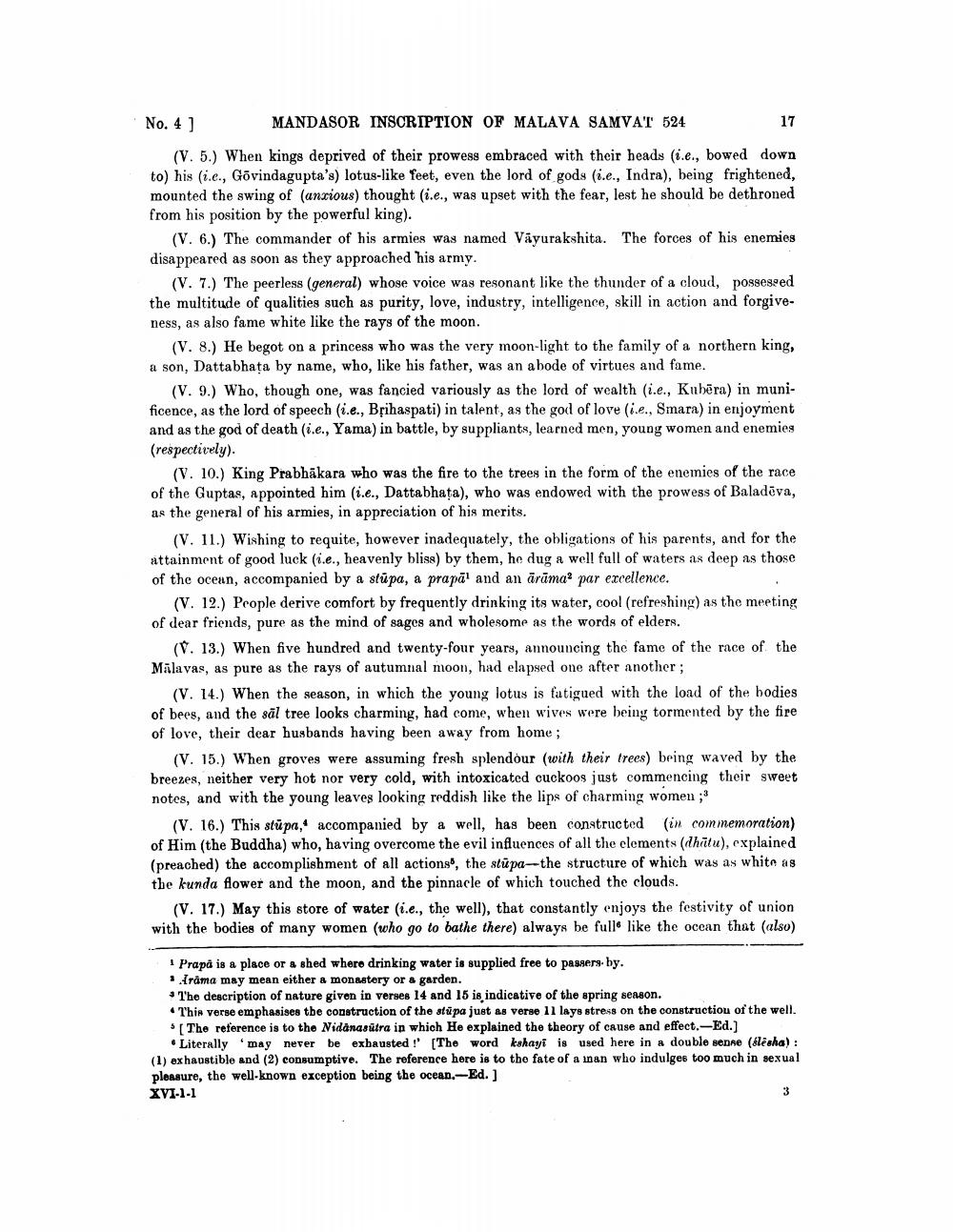________________
No. 4 ] MANDASOR INSCRIPTION OF MALAVA SAMVAT 524
17 (V. 5.) When kings deprived of their prowess embraced with their heads (i.e., bowed down to) his (i.e., Govindagupta's) lotus-like feet, even the lord of gods (i.e., Indra), being frightened, mounted the swing of (anxious) thought (i.e., was upset with the fear, lest he should be dethroned from his position by the powerful king).
(V. 6.) The commander of his armies was named Väyurakshita. The forces of his enemies disappeared as soon as they approached his army.
(V. 7.) The peerless (general) whose voice was resonant like the thunder of a cloud, possessed the multitude of qualities such as purity, love, industry, intelligence, skill in action and forgiveness, as also fame white like the rays of the moon.
(V. 8.) He begot on a princess who was the very moon-light to the family of a northern king, a son, Dattabhata by name, who, like his father, was an abode of virtues and fame.
(V. 9.) Who, though one, was fancied variously as the lord of wealth (i.e., Kubēra) in munificence, as the lord of speech (i.e., Brihaspati) in talent, as the god of love (ie., Smara) in enjoyment and as the god of death (i.e., Yama) in battle, by suppliants, learned men, young women and enemies (respectively).
(V. 10.) King Prabhakara who was the fire to the trees in the form of the enemies of the race of the Guptas, appointed him (i.e., Dattabhata), who was endowed with the prowess of Baladova, as the general of his armies, in appreciation of his merits.
(V. 11.) Wishing to requite, however inadequately, the obligations of his parents, and for the attainment of good luck (i.e., heavenly bliss) by them, he dug a well full of waters as deep as those of the ocean, accompanied by a stúpa, a prapat and an ärūma par excellence.
(V. 12.) People derive comfort by frequently drinking its water, cool (refreshing) as the meeting of dear friends, pure as the mind of sages and wholesome as the words of elders.
(V. 13.) When five hundred and twenty-four years, announcing the fame of the race of the Mälavas, as pure as the rays of autumnal moon, had elapsed one after another;
(V. 14.) When the season, in which the young lotus is fatigued with the load of the bodies of bees, and the sāl tree looks charming, had come, when wives were being tormented by the fire of love, their dear husbands having been away from home;
(V. 15.) When groves were assuming fresh splendour (with their trees) being waved by the breezes, neither very hot nor very cold, with intoxicated cuckoos just commencing their sweet notes, and with the young leaves looking reddish like the lips of charming women ;
(V. 16.) This stūpa, accompanied by a well, has been constructed in commemoration) of Him (the Buddha) who, having overcome the evil influences of all the elements (dhitu), explained (preached) the accomplishment of all actions, the stūpa--the structure of which was as white as the kunda flower and the moon, and the pinnacle of which touched the clouds.
(V. 17.) May this store of water (i.e., the well), that constantly enjoys the festivity of union with the bodies of many women (who go to bathe there) always be fulle like the ocean that (also)
Prapa is a place or a shed where drinking water is supplied free to passersby.
Arama may mean either a monastery or & garden. • The description of nature given in verses 14 and 15 is indicative of the spring season. • Thin verse emphasises tbe construction of the stupa just as verse 11 lays stress on the constructiou of the well.
[The reference is to the Nidanasūtra in which He explained the theory of cause and effect.-Ed.) • Literally may never be exhausted!' [The word kshayi is used here in a double sedne (flesha): (1) exhaustible and (2) consumptive. The reference here is to the fate of a man who indulges too much in sexual plensure, the well-known exception being the ocean.-Ed.) XVI-1-1




